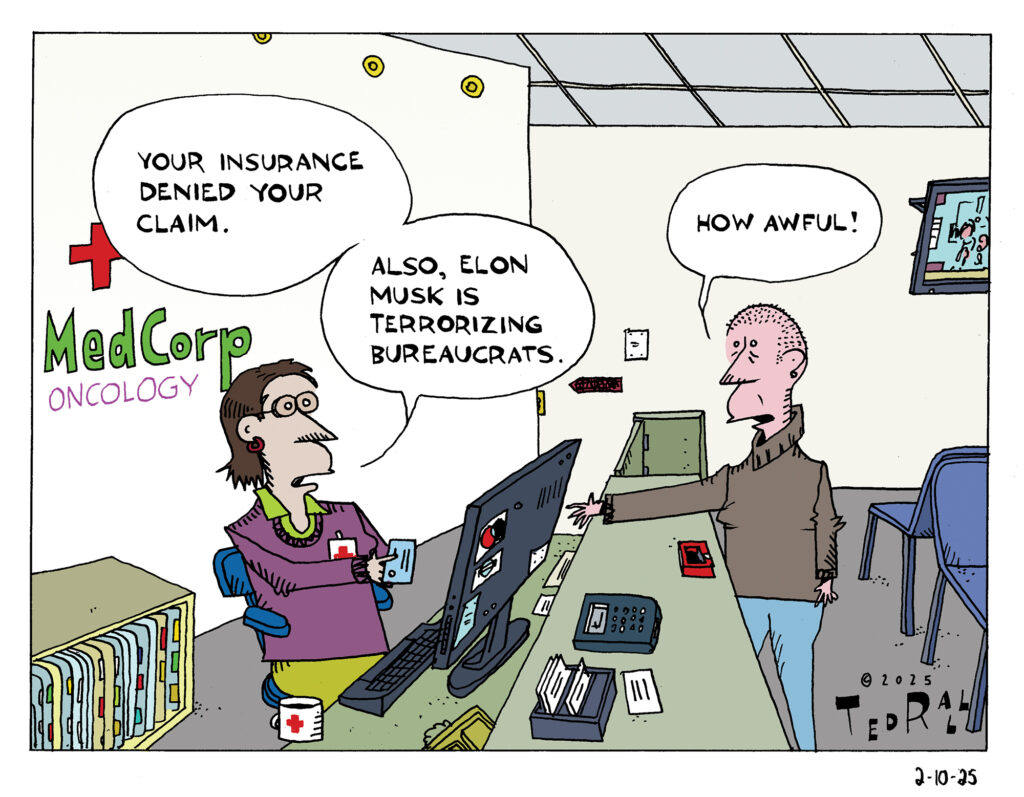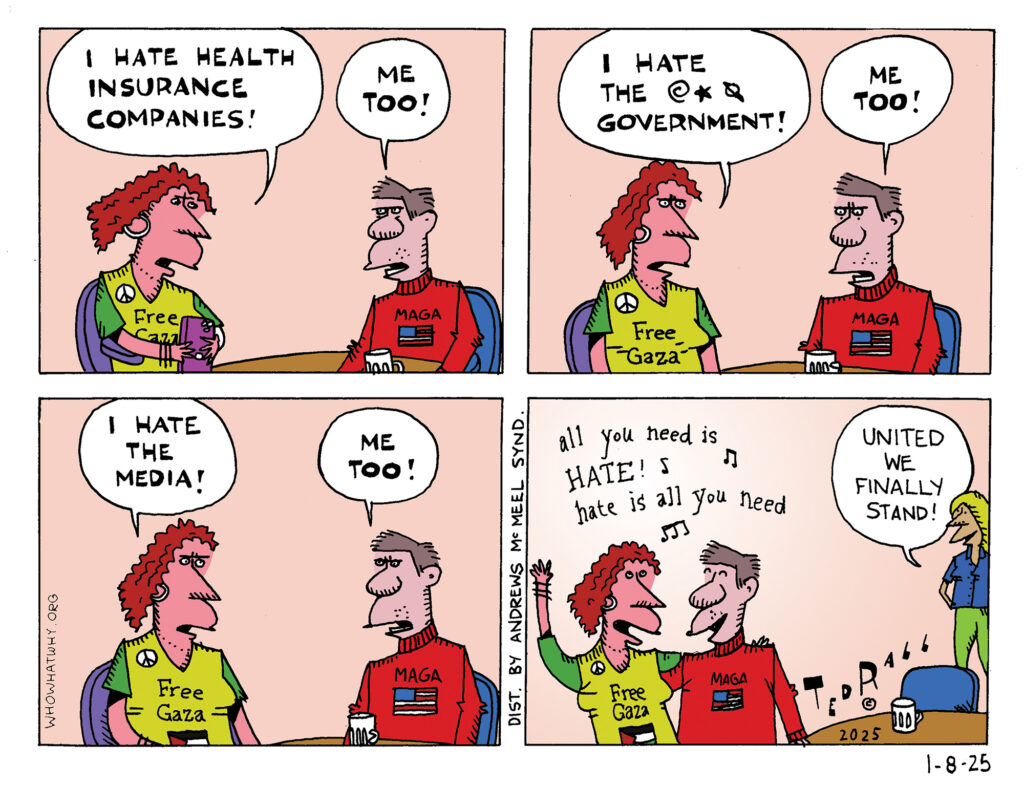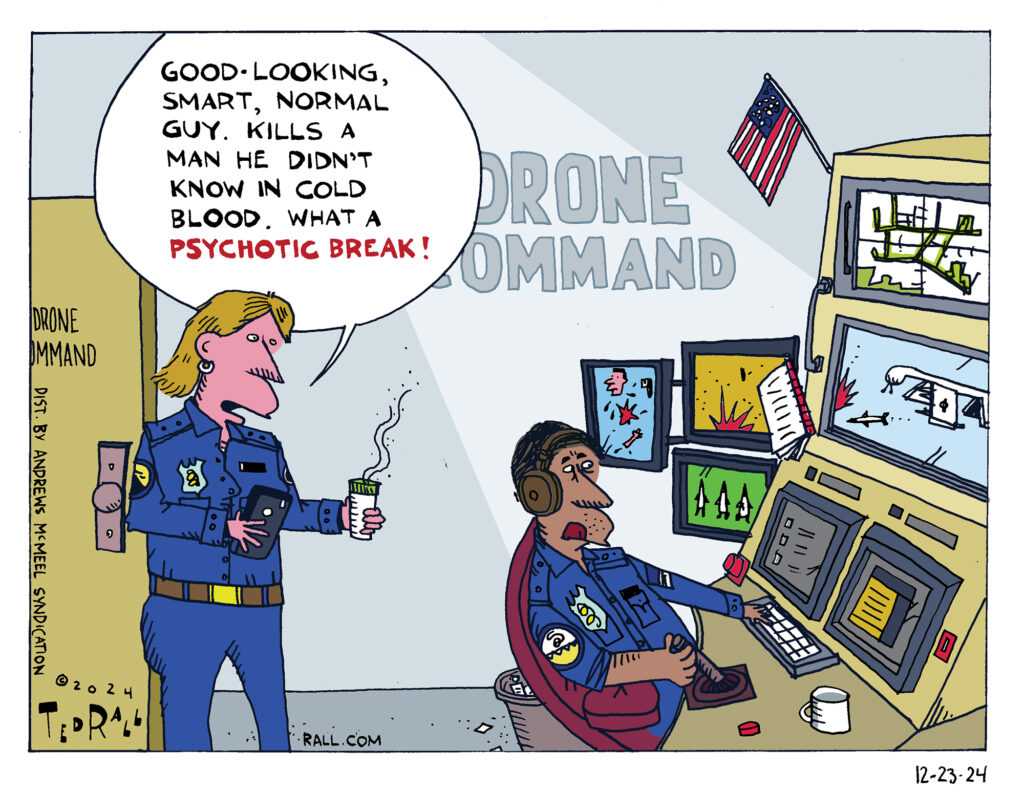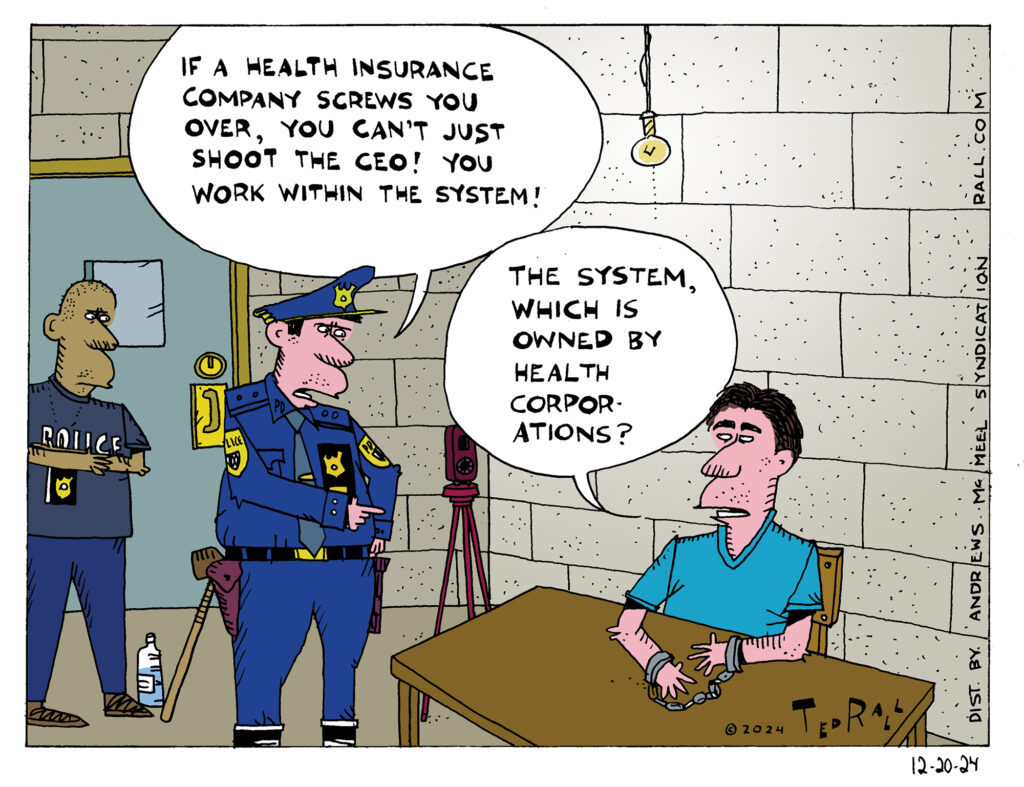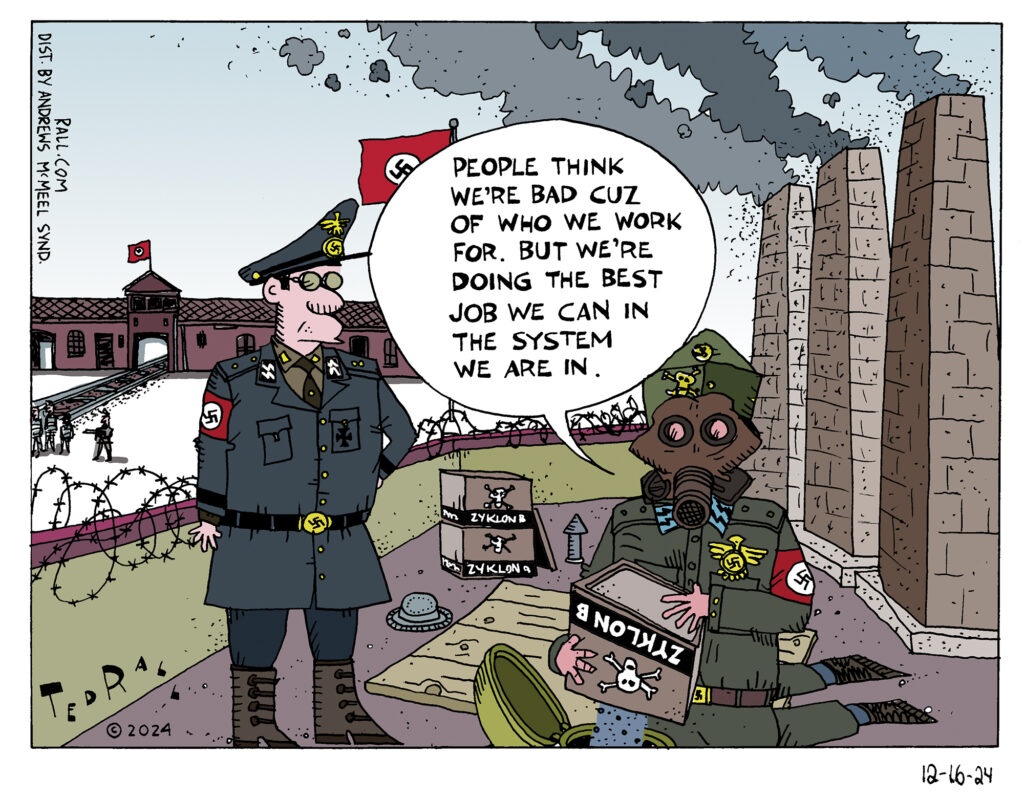DOGE leader Elon Musk is gutting government agencies, including US-AID. Why do so many liberals and Democrats seem to get more agitated about Trump’s war on DC bureaucrats than capitalism’s longstanding war against ordinary Americans?
TMI Show Ep 55: “CEOs in the Crosshairs”
Rather than be followed by the expressions of sympathy and shock one might usually expect, the murder of United Healthcare CEO Brian Thompson in New York was also greeted with ridicule and even approval by a substantial portion of the public. Worried that copycat killers might take that response as a cue to replicate the alleged actions of accused shooter Luigi Mangione, CEOs and their companies are reconsidering their security measures.
With the Inauguration days away, how does this inform the security landscape for that high-profile event? Are CEOs paranoid or are they really at increased risk now? What can they and ordinary people worried about their personal security do to make themselves safer?
Ted Rall and Manila Chan ask these questions to security expert Mark Ledlow, a former US Marine and founder of Ledlow Security.
Capitalism At a Glance
Before he allegedly killed United healthcare CEO Brian Thompson, Luigi Mangione was considered intelligent, thoughtful, kind, funny, and well-adjusted in every way. Now, because he killed someone, probably for political reasons, he’s considered insane. But what does that say about all the other people who kill for political reasons, like the President? Or Thompson himself?
Are Killers Insane?
 As is typically the case after a high-profile murder, people are speculating about suspect Luigi Mangione’s state of mind when he allegedly killed United Healthcare CEO Brian Thompson outside a Hilton hotel in Manhattan.
As is typically the case after a high-profile murder, people are speculating about suspect Luigi Mangione’s state of mind when he allegedly killed United Healthcare CEO Brian Thompson outside a Hilton hotel in Manhattan.
We have a likely (political) motive in the form of a handwritten statement Pennsylvania police say they found on Mangione when they arrested him. “Frankly, these parasites simply had it coming,” it reads. “A reminder: the US has the #1 most expensive healthcare system in the world, yet we rank roughly #42 in life expectancy. United is the fourth largest company in the US by market cap, behind only Apple, Google, Walmart. It has grown and grown, but as our life expectancy? No, the reality is, these [indecipherable] have simply gotten too powerful, and they continue to abuse our country for immense profit because the American public has allowed them to get away with it…It is not an issue of awareness at this point, but clearly power games at play. Evidently I am the first to face it with such brutal honesty.”
Thompson’s death immediately prompted the widespread assumption that his killer had to have been motivated by something personal. The CEO must have been the victim of a vengeful patient, or someone who loved and lost a person to an insurance denial. There are, after all, numerous Americans whom United Healthcare refuses to cover for medical treatment. Some die. But the man they arrested doesn’t fit the bill. Though Mangione’s social media feeds indicate that he had major back surgery following an injury, the operation appears to have been successful. There is no evidence that an insurance company denied his claim. United Healthcare says Mangione has never been their customer.
This looks like a case of self-radicalization.
Mangione was privileged and high-functioning. If he can become a one-man terrorist group, anyone can.
The establishment press can’t wrap its collective head around it.
Writing in The New York Times, David Wallace-Wells is among the many journalists who wondered aloud: “We’ve seen the video of him shouting at the press as he’s pulled into the courthouse, which suggests perhaps some disquiet. But we also haven’t heard from anybody who interacted with him at any point in his life who found him anything but levelheaded, cleareyed, calm and even kind.” Why might someone with Mangione’s background (white, well-off, Ivy-educated), looks (women have been swooning over him online) and social currency (he was friendly and popular) stalk a business executive he’d never met and gun him down?
Perhaps, some reports suggested, back pain from spondylolisthesis drove him insane. Or that pain made it impossible for him to have sex and that made him nuts. Or his turn to violence was inspired by Ted Kaczynski’s Unabomber manifesto. He was 26, the average age when schizophrenia first manifests—maybe a mental time bomb was behind his psychotic break. One of these explanations may prove true. Or none. Luigi Mangione may be sane. He may simply be a class traitor.
Wallace-Wells continued: “In many ways, the obvious explanation is that the attack was the result of some kind of breakdown. But aside from the shooting itself, we haven’t seen any real signs of a breakdown.” (Except for shouting at the press. Wallace-Wells thinks that makes you unwell.)
Interesting questions arise from the assumption that mental illness is “the obvious explanation” for why people kill. We are going to have to radically rethink our society if that’s true.
Are prison employees who administer capital punishment insane? What about combat troops who kill enemy soldiers whom they have nothing against personally, simply because they’re given an order? Are members of the military lunatics? Must one be crazy to serve as President, a job that involves ordering men and women to shoot and bomb other people—sometimes en masse—and signing off on extrajudicial assassinations, as with drones? Harry Truman dropped The Bomb. Was he psycho? What of a police officer who shoots a suspect? If a health insurance company unfairly denies life-saving medical care to a patient and the patient dies, which one can argue is tantamount to murder, does that make a CEO like Thompson a murderer too—and therefore insane?
If everyone who kills a human being is psychotic, shouldn’t every killer be granted an insanity defense and automatically be sent to a psychiatric facility rather than prison?
What about farmers who kill animals? Vets who euthanize them?
When Marianne Bachmeier entered a German courtroom in 1996 and shot to death the man who raped and murdered her seven-year-old daughter, there was no confusion. Everyone understood her motivation. It was personal, relatable and therefore there was no talk that she might be bonkers.
Should it turn out that Mangione’s motive was personal, and that he or someone he cared about suffered pain at the hands of the health insurance industry, the discomfort of the chattering classes would be mitigated. Oh. That makes sense.
It is possible, though—likelier, really—that Mangione engaged with the question of America’s for-profit healthcare system impersonally and intellectually, yet passionately. Like those who marched against the Vietnam and Gaza wars despite having no personal stake in the conflict, it is hard not to feel disgust and outrage when one hears horrific accounts of insurance companies denying and delaying valid claims as they rake in billions. Mangione had to have known, as everyone does, that there is no prospect of healthcare reform coming out of a Washington in which neither political party wants to fix the system.
People kill other people in service to far more abstract concepts than affordable healthcare. Political leaders kill over such dubious controversies as arbitrary borders and the Domino Theory and NATO Expansion and the Shia-Sunni Schism, yet nobody thinks they’re insane.
Murder, all societies agree, is wrong—unless it’s committed by someone officially authorized to take life. Vigilantism is problematic because, taken to its logical extreme, the rule of law would collapse.
Dismissing a vigilante’s actions as the product of an unsound mind, however, thoughtlessly brushes off the question of why he feels compelled to resort to an act so drastic that it will probably end his own life as well. When one is confronted with massive suffering and heinous injustice, when society doesn’t offer a legal mechanism to stop these horrors, is it inherently insane to say to yourself: someone should do something? Or to conclude: if the answer is yes, why not me?
(Ted Rall (Twitter: @tedrall), the political cartoonist, columnist and graphic novelist, co-hosts the left-vs-right DMZ America podcast with fellow cartoonist Scott Stantis and The TMI Show with political analyst Manila Chan. His latest book, brand-new right now, is the graphic novel 2024: Revisited.)
Work Inside Our System
Defenders of the health insurance industry reacted to the murder of United Healthcare CEO Brian Thompson in New York by saying that murder and violence are never the answer because there’s always the option of working within the political system to reform a business based on profiting off pain, misery and death of sick Americans. In reality, however, the system does not allow any challenge to the status quo.
TMI Show Ep 36: “Health Insurance Horror Stories”
The shooting death of United Healthcare CEO Brian Thompson has sparked a national conversation about the state of healthcare in the United States. The accused shooter, Luigi Mangione, allegedly wrote a manifesto in which he pointed out that the U.S. has low life expectancy despite paying the highest costs for healthcare in the world. And he appears to have lit a fuse as “Wanted” posters have gone up on the city streets depicting other health insurance company executives accused of putting profits before their clients’ health at the same time Thompson’s bereaved family laid one of the most despised dead people in America to rest.
“The TMI Show”’s resident leftist Ted Rall, guest co-host Robby West and guest Steve Gill, a conservative talk host, discuss Health Insurance Horror Stories, the future of for-profit healthcare under Trump and what, if anything, could be done to reduce Americans’ anger at a system that ought to be helping them.
DMZ America Podcast Ep 184: It’s Vigilante Time!
The DMZ America Podcast’s Ted Rall (on the Left) and Scott Stantis (on the Right) discuss a pair of stories that reflect a disturbing trend: as the government turns more lawless and fails to enforce the law, Americans are taking the law into their own hands—and voters seem to approve.
A Manhattan jury acquitted Daniel Penny, the subway rider who strangled a mentally-ill homeless man, Jordan Neely, using a choke hold that the NYPD is banned from using in the line of duty. And Luigi Mangione, the 26-year-old man accused of shooting UnitedHealthcare CEO Brian Thompson to death in New York has become a folk hero to patients angry at the way they’re treated by health insurance companies.
If the system fails, is it acceptable to roll “Death Wish” style? Ted and Scott debate the social and political ramifications.

